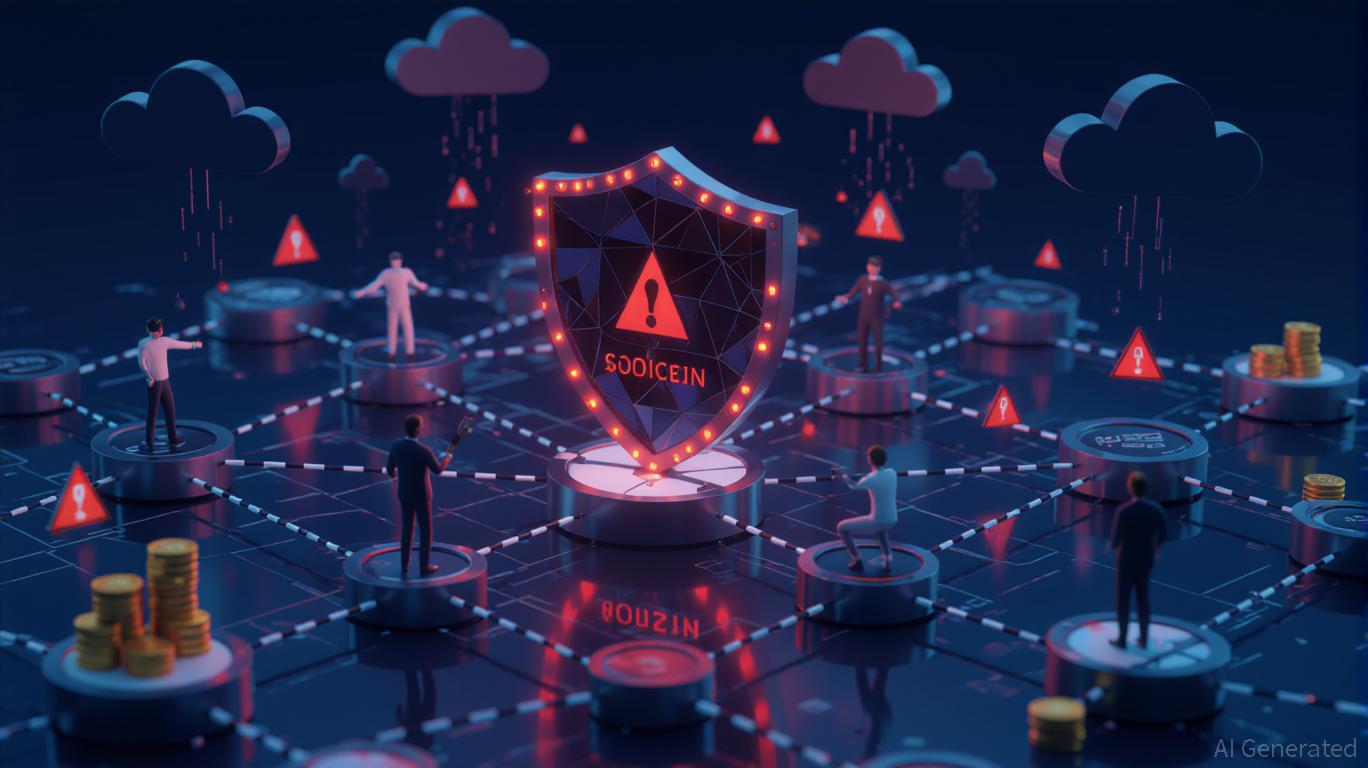COAI Token Fraud Unveiled and Its Impact on DeFi Safety: Evaluating Regulatory Preparedness and Shortcomings in Investor Safeguards within Developing Cryptocurrency Markets
- COAI token's 2025 collapse exposed DeFi vulnerabilities in emerging markets due to governance failures and regulatory ambiguity. - CLARITY Act's vague AI token definitions and U.S. regulators' conflicting classifications (securities vs. commodities) worsened market uncertainty. - Southeast Asia's crypto scams, including She Zhijiang's Myanmar operation, exploit weak governance and jurisdictional loopholes to defraud $10B annually. - IRS DeFi rules face legal challenges over privacy concerns, while platfo
Unclear Regulations and the CLARITY Act’s Mixed Impact
The proposed CLARITY Act made matters worse for the COAI token, leaving AI-related crypto projects in a state of legal uncertainty. Although the bill was intended to clarify what qualifies as an AI token, its ambiguous wording led to confusion, discouraged large investors, and increased market instability
At the same time, the Bank of England has moved quickly to update its stablecoin rules to match U.S. timelines, reflecting a worldwide effort to clarify regulations. Still, requirements for reserve audits and redemption processes—crucial for DeFi’s liquidity—remain controversial, as issuers find it difficult to meet compliance demands without sacrificing efficiency

Southeast Asia: Center of Scam Activity and Regulatory Shortcomings
Developing regions, especially Southeast Asia, have become major hubs for international crypto fraud. The U.S. Department of Justice (DOJ) launched the "Scam Center Strike Force" in 2025,
One notable example is She Zhijiang, a businessman born in China who was extradited to China in 2025 for operating a fraudulent compound in Myanmar’s Shwe Kokko region. His case highlights both the global reach of crypto scams and the gaps in enforcement: while authorities may shut down specific operations,
Investor Safeguards: Navigating Between Progress and Regulation
New DeFi rules from the IRS have led to court challenges, with blockchain supporters arguing that terms like "broker" and "trading front-end service" do not accurately reflect the decentralized nature of DeFi
Looking Ahead: Finding the Balance Between Progress and Protection
For DeFi to reach its full potential, regulators must take a more sophisticated approach. Developing economies need unified regulations to stop legal loopholes, while advanced markets should clarify definitions for AI tokens and stablecoins to minimize confusion. The downfall of the COAI token is a clear warning: without strong investor protections and international cooperation, the risks in DeFi will continue to overshadow its potential benefits.
Disclaimer: The content of this article solely reflects the author's opinion and does not represent the platform in any capacity. This article is not intended to serve as a reference for making investment decisions.
You may also like
Hyperliquid News Today: ZKP Leads Crypto’s Transformation from Speculative Trading to Efficient, Privacy-Focused Computing
- ZKP, a self-funded decentralized compute network, claims $100M infrastructure to outpace Ethereum and Hyperliquid with immediate utility via hardware-based Proof Pods. - The project secured $17M in pre-orders for plug-and-play Pods generating on-chain rewards, contrasting with competitors' phased upgrades and speculative models. - Rising institutional interest in privacy coins like Zcash (ZEC) highlights shifting capital toward privacy-focused assets as ZKP bridges AI and blockchain with transparent earn

ZKP Disrupts Traditional Crypto Standards Through Open Auctions
- ZKP introduces a crypto presale model using daily on-chain auctions to eliminate insider advantages and prioritize market-driven price discovery. - The project allocates 200 million tokens daily via proportional contributions, with a $50,000 cap to prevent market manipulation by large investors. - Unlike traditional presales, ZKP has no private allocations, team unlocks, or venture capital deals, ensuring equal access for all participants. - Custom Proof Pods validate cryptographic proofs and earn reward

Bitcoin News Update: Cash App Connects Users to Global Finance Using Bitcoin and Stablecoins
- Cash App, operated by Block Inc. , introduces Bitcoin Lightning Network and stablecoin payments, aiming to boost mainstream adoption of digital assets for everyday transactions. - The updates enable 58 million users to send/receive Bitcoin instantly and low-cost, while merchants can accept BTC in multiple formats without fees until 2027. - Stablecoin support via Solana’s USDC aligns with the GENIUS Act, enhancing fast, dollar-pegged transactions and regulatory clarity for merchants and consumers. - Block

ALGO Drops 5.28% in 24 Hours Following Passkey Breakthrough and Market Volatility
- Algorand's ALGO token fell -5.28% in 24 hours on Nov 13, 2025, amid broader crypto market volatility and macroeconomic concerns. - The Algorand Foundation launched Liquid Auth, a decentralized passkey manager integrated with Pera Wallet, promoting self-custody and privacy in Web3 identity management. - Despite technological innovation, ALGO's multi-timeframe declines (-51.24% in 1 year) highlight liquidity risks and bearish momentum as traders react to market conditions. - Technical analysis shows ALGO b